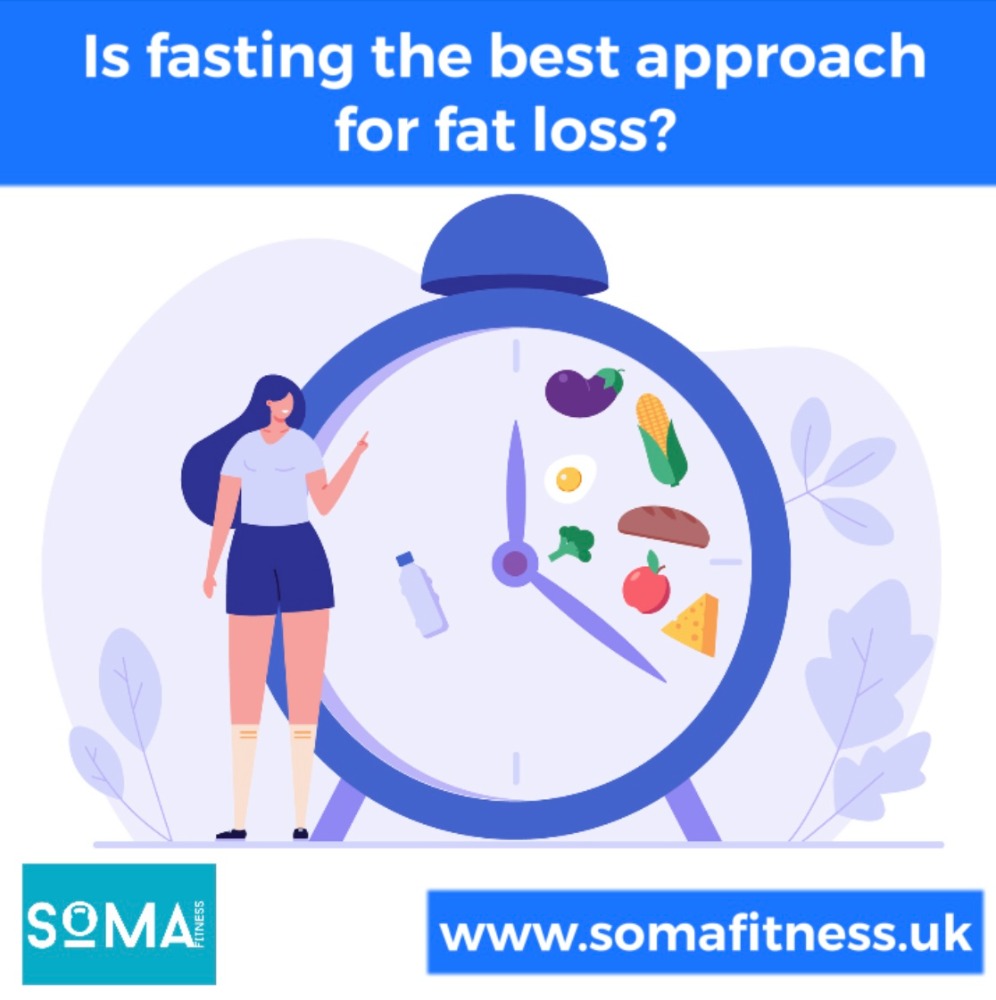Is fasting the best approach for fat loss?

What is fasting?
Before getting into the pros and cons, first we need to define fasting. Fasting can be defined as a period of time refraining from food. Some fasts allow for water, whilst others do not. This extreme approach often results in extreme results but is this beneficial for fat loss? To allow us to critically analyse this we need to identify the factors of a lifestyle that must occur to result in optimal fat loss.
- A Calorie Deficit:
A calorie deficit is where one expends more calories than they consume. A fast achieves this as you literally consume 0 calories. Therefore, this will guarantee weight loss. However, note this is weight loss, some of which will be fat tissue but what proportion is fat tissue will be due to other factors that are mentioned below.
In the case of intermittent fasting (typically eating in an 8-hour window of each day). Some calories are consumed so the approach is not as extreme. However, when compared with any other approach that results in the same calorie deficit, fat loss results are no better. Although, some find it as a great tool to control calorie intake, therefore it’s positives and negatives can change person to person.
- Adequate protein intake.
Protein contributes to the growth and maintenance of muscle tissue. This is very important when trying to optimise fat loss because when we are in a calorie deficit, the body will lose weight via fat and muscle tissue (water too in the short term). Therefore, if we want to maximise fat loss, we need to do everything we can to maintain the muscle tissue we have and consuming adequate amounts of protein is vital for this to occur.
Fasting does not allow us to consume adequate amounts of protein. In fact, it allows us to consume no protein whatsoever. Therefore, when one loses weight via fasting, a considerably higher proportion will be lost via muscle mass vs if they had adopted a calorie deficit that allowed them to consume a protein intake of around 2.2g per kg of bodyweight. To put this into a practical example, someone who is 75kg would have to consume 165g of protein per day to maximise muscle retention whilst in a calorie deficit.
In the case of intermittent fasting, consuming adequate daily protein is possible. However, protein timing is also important as muscle protein synthesis (the process by whilst muscle is built and/or retained) dips every 4 hours. Therefore, if you don’t consume anything for 16 hours, then muscle retention will be very low for 12 hours a day, rendering poorer results compared to if you had adopted the same calorie deficit but spaced out your protein intake across the day.
- Adequate Sleep
When we sleep, muscle protein synthesis is elevated. Therefore, in order to optimise muscle retention, one needs to get enough sleep. This will differ depending on a person’s age and training but a good rule of thumb for optimal sleep would be 7 hours + how many hours training you did that day. For example, if you trained for an hour then you will need 8 hours sleep for optimal recovery.
When fasting, people can respond differently to how it affects their sleep. For many though, feelings of hunger leave them restless and unable to fall to sleep. This reduction in sleep, and therefore recovery.
- Adherence
You’re going to be consuming food for the rest of your life so unless you can confidently say that you can fast/intermittently fast for the rest of your life, then the chances are you will give up at some stage and fall into old habits. That’s why choosing a nutritional approach that you can adhere too is crucial for long term success. For many, fasting is very restrictive and boring to follow after a period of time and therefore not a good approach for many to choose. However, for others intermittent fasting is easy to follow, therefore it is down to you to be honest with yourself about what approach is best for you. Remember that your diet should not feel like a chore.
- Adequate resistance training
Although this is technically not part of one’s diet. It is important to mention that resistance training contributes to the maintenance of muscle tissue in a calorie deficit and is therefore a non-negotiable for anyone looking to optimise fat loss. Amount of training needed in order to achieve this will differ between individuals but a good rule of thumb would be 2-3 whole body resistance sessions per week.
Fasting can leave people feeling energised in the short term but very low energy after a longer period of time. This will directly impact resistance training sessions that require glucose to fuel your sessions. We convert glucose primarily from glycogen via Glycogenolysis but also can also get it from proteins and fats (via gluconeogenesis). Therefore, it is important to perform resistance training sessions properly fuelled if you want to maximise fat loss in the long term.
Summary:
Overall, fasting and intermittent fasting does not seem to optimise fat loss. But remember that fat optimisation is only really important for anyone wanting to get to really lean levels of body fat (12% or below for men and 17% or below for women). If you are really struggling to keep off the first few pounds of body fat and you feel that intermittent fasting is the only tool that you can adhere to, then it’s a perfectly viable tool to use.

Recent Comments